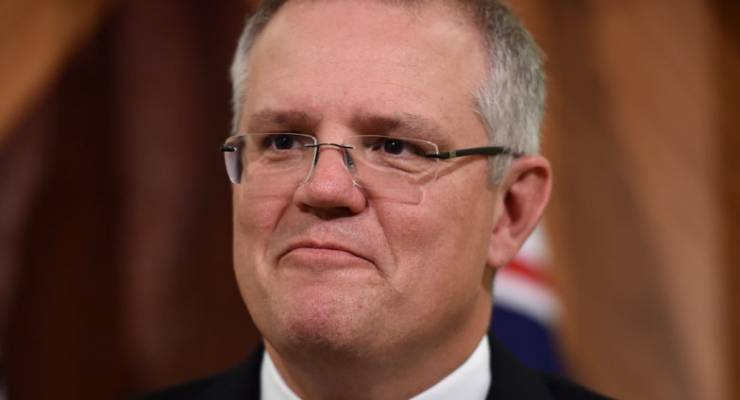
The economy racked up its strongest growth since 2012 in the June quarter — confirming the growing view that Australia is back in the international winners’ circle and the long period of decline in our terms of trade might be coming to an end.
The June quarter national accounts figures from the Australian Bureau of Statistics, which close the book on the 2015-16 financial year, were better than many forecast. Seasonally adjusted quarter on quarter growth was 0.5% — down as expected from 1% rate in the March quarter (restated from 1.1%), but that still means GDP grew 3.3% through the year, above the 2.75% forecast in the May budget papers (and well above the MYEFO estimate of 2.5% last December).
As expected, the trade account was the big difference between the March and June quarters: it made a 1.2 percentage point contribution in March but detracted from growth in the latest three months, driven by stronger growth in imports. But our terms of trade rose 2.3% in seasonally adjusted terms, which is the first increase since the December quarter of 2013, meaning that while across the year terms of trade fell 5.4%, we easily avoided the budget forecast of an 8.75% fall. That augurs well for the mild recovery in terms of trade this financial year, which the government is banking on in the budget.
As the ABS’ flawed capital expenditure numbers have been telling us, investment is still a problem. “Total investment was flat in the quarter, with the continued reduction in engineering construction associated with the mining sector offset by growth in public investment,” the ABS said. But domestic final demand grew 0.6%, supported by solid household and public consumption; compensation of employees rose by 0.5% in the June quarter to be 3.1% higher through the year, while the household saving ratio was a high 8.0% in seasonally adjusted terms in the June quarter 2016.
And we continued our winning way on productivity — a success story the media and business are strangely unwilling to trumpet. As Crikey has previously noted, Australia has been the strongest performer in the OECD on productivity growth in recent years. Market sector labour productivity was up 0.9%, which follows another strong performance of 0.7% in the March quarter, meaning total labour productivity growth in 2015-16 was 2.3%, a big recovery from 2014-15 when it dipped to 1.3% — at a time when other advanced economies are seeing declining productivity.
Suddenly Australia is returning as a global favourite – despite the S&P CreditWatch negative on our AAA rating, growth is running at three-year highs, the terms of trade are back in the black for the first time in two and a half years, and productivity is up. The Economist, an international sceptic about many things Australian in recent years and constant whiner about our property market, is again singing our praises:
“Australia is often called ‘the lucky country’, and luck, particularly in geology and geography, has played a part in its success. But it has deftly played both sides of the China boom: the surging demand for raw-material imports while that lasted; more recently, the desire of the Chinese middle-class to eat well, travel and educate their children in English.”
True, as The Economist says, we’re overexposed to China, a point that Malcolm Turnbull and Scott Morrison have made an effort to convey in recent days, but there are worse economic problems to have.
Not that being an international favourite is necessarily all good. Remember the last time we were the darling of the world’s economists, investors and central bankers, when Wayne Swan was treasurer and we were successfully riding a mining investment boom? The result was a painfully strong dollar that smothered our exporters and import-competing sectors. And while the dollar dipped a little in response to the GDP figures not being quite as brilliant as some had forecast, the Aussie is still persistently strong, and likely to get stronger in coming months.
A final thing: it’s now been 25 years since Australia had a recession. We came damn close in 2009 but avoided one thanks to the timely actions of the Reserve Bank, Kevin Rudd and Wayne Swan. And all policymakers, elected or appointed, on all sides over the decades since the last recession deserve a nod of appreciation. We like to bag our politicians and public servants, but a quarter century without knowing the misery, the dislocation and waste of human life that comes from high unemployment is something to be very proud of.








If you disregard the fact that real incomes are declining whilst debt is increasing there is much to celebrate in the statistics gathered by Mr Keane’s beloved ABS.
” the dislocation and waste of human life that comes from high unemployment” and from wide-spread part-time underemployment, and from a generation mis-educated and mis-trained by a distorted and corrupted tertiary sector.
What a smirking mug shot of Morrison that is. I hope that prig isn’t taking any credit for it. Comments also noted, very true. I am much less worried about the exposure to China than I am about a meltdown in the real estate bubble, that it will happen and that it might not, both are terrible precipices we are hanging over.
And will we see greater tax revenues out of this growth, or will multi-nationals be able to squirrel away their often given-away gains in the Caymans, again?
Actually, there is a hell of a lot wrong with our economy, all we have bought is a bit more time to deal with the iniquities and inequities of our economy and polity. Unfortunately we have neither the parties nor the political tools to meet that challenge.
But all is well. I think I’ll go back to my fiddle and block out the smell of the burning city around me.
Dancing on thin ice would seem to sum up the current Smouldering of Vanity.